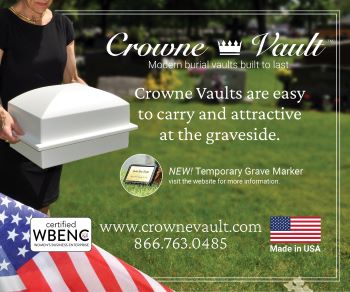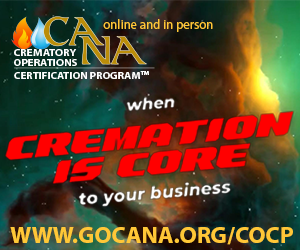Will the coronavirus change how we grieve
 For those of you readers who are not funeral directors, have you attended a funeral in the last six months? I haven’t. . . . and I cannot remember when the last time I attended a funeral was.
For those of you readers who are not funeral directors, have you attended a funeral in the last six months? I haven’t. . . . and I cannot remember when the last time I attended a funeral was.
Truth be told, since I have left full-time funeral directing and management, I have chosen to go to visitations much more than funerals anyway. I like the ability to just drop in – and out – as I wish and not sit for a formal funeral service. And, in the days of COVID, I just feel safer going to a visitation than a funeral. . . even if a funeral was allowed in the rules of social distancing.
It is on the back of that short preamble that I share this article from the Grand Forks Herald entitled, “The coronavirus has changed how we grieve“. The following is a paragraph from that article as written by columnist Marilyn Hagerty:
“Many people will send sympathy cards, floral arrangements. They will drop off food at the doorstep of families who have suffered a death. But they do not gather at funerals. They do not share meals at the church. There are no churches packed with mourners. Grieving is different since coronavirus became a cloud over normal life.”
The article continues with some comments by North Dakota funeral directors who share that people still care and want to help, but many of the traditional avenues of grief help have been taken away by our social distancing and contagion concerns. Funeral director Greg Norman comments, “. . young people are missing the meaning of gatherings.”
Norman also comments that many people miss the large memorial gatherings and even the luncheons and receptions that follow. He comments, “There’s good will and tenderness that comes out in these ways. The hotdish is important.”
Other funeral directors acknowledge that technology has become increasingly important. These services can be recorded and the mourning community can watch at their own time which has been a help for many.
The length and breadth of the pandemic has taken its toll on people in small communities also. Paul Amundson of the Amundson Funeral Home in Grand Forks, North Dakota, is quoted as saying about the pandemic, “We didn’t imagine that it would continue through the year. I think people understand that now.’’
Funeral Director Daily take: I don’t know what to think about this issue. I many times think that we live in a world that requires diametrical opposites. For instance, the more activity one has, the more rest they will need. The more you engage your brain in difficult study or operations, the more you need to disengage in non-thought exercises.
So, I believe in the more high-tech our world gets, the more high-touch human beings have to be. At least it seems to work that way for me. And, a year in a COVID-19 world has pointed that out to me.

Tom Anderson
Funeral Director Daily
I’m a relationship person. I think I was a successful funeral director because I enjoyed the human interaction with people at all times. . . and that interaction helped me meet people who then used our funeral services when needed.
COVID-19 has blocked me from many of my personal interactions and I miss that. I think a lot of people miss that. . . .and I’m pretty sure that the grieving families miss it, too.
The issue that I worry about. . . not only in grief relief, but in many mental health instances, is that many may start to believe all that they need is the “connection via technology”. Many may think that is true, but my guess is that there will be people who think that to be true. . . when it isn’t. And, that thought process will cause problems down the road.
My belief is that the faster we can get back to in-person services, the better the families we serve will be. I also believe that technology, from here on out, will be an important “piece” of the death care realm, but it cannot replace the “high-touch” interpersonal relationships that funeral and memorial service attendance can bring.
Whatever happens moving forward. . .you can bet that funeral directors will adapt and continue to be the major ingredient in the care given to grieving families. The smart and evolutionary funeral business will be ready and open for what these adaptations may mean.
More news from the world of Death Care:
- Even in death you can be eco-friendly. Bainbridge Island Review (WA)
- Board asks Governor to support veterans cemetery project. Crawford County Avalanche (MI)
- Cremation ashes to stones? How’d you like to skip your loved ones remains across a pond? Chicago Sun Times (IL)
- Funeral homes adjust to increased business and state guidelines coronavirus pandemic. Lancaster Eagle Gazette (PA)
- Funerals continue without large crowds as families adjust to services during pandemic. News video and print article. WDRB.com (KY)
Enter your e-mail below to join the 1,885 others who receive Funeral Director Daily articles daily:




















I must chime in. Thank you for your thoughts. I agree most totally. We must get back to relationship. In every situation that I have seen in business there is an opportunity. I have written a book, my second, entitled Funeral Services: the Good, the Bad, and the Opportunity. It is soon to be released. So what is the opportunity in the Covid crisis for our profession and how do we get back to our professional traditions and value propositions? I will share and comment only from my perspective. We take the funeral on the road. We can do Covid-compliant wakes and funerals in front of extended care facilities, nursing homes, family residences, condo complex facilities, etc. There is no limit to the opportunity. Do a coffee and cookie reception or a food truck in conjunction with this. Using the Coasson (of course!) we can show the casket, even open, or the urn. We have a ceremony that involves the people in a unique way. It is a process that creates a value proposition, revenue, marketing opportunity, and future. After Covid, this model goes to golf courses, baseball diamonds or soccer fields, lake shores, etc. 3 funeral homes have expanded their fleets to service this model in the last month. I could go on but will stop and simply say that I would discuss with anyone. Again, thanks for this article. Right on!